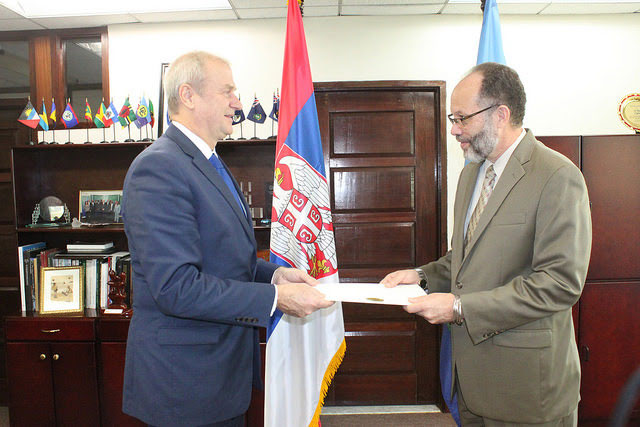The Caribbean Community (CARICOM) and the Republic of Serbia on Wednesday formalised diplomatic relations with a first Ambassador accredited to CARICOM from the south eastern European country.
CARICOM Secretary-General, Ambassador Irwin LaRocque, accepted the credentials of His Excellency Djerdj Matković at a simple ceremony at the Headquarters of the CARICOM Secretariat in Georgetown, Guyana on 11 January 2017, welcoming him to the “Community’s network of friends.”
Before this move to formalise relations, CARICOM and Serbia had interactions within the United Nations system, through Serbia’s observer status in the Non-Align Movement, and the Organisation of Eastern Caribbean States. The Republic of Serbia also has bilateral relations with some CARICOM Member States through which it offered scholarships to CARICOM nationals under its World in Serbia Scholarship Project.
Against this backdrop Ambassador LaRocque told the Serbian envoy that it was timely and right to augment relations through the mechanism of his accreditation. He noted that they had chosen a time to strengthen ties in an era of “unprecedented promise and exceptional challenges.”
“We have the opportunity to partner to advance the United Nations Sustainable Development Goals (SDGs) and the Climate Change Agreement that aim to ensure global survival as well as create more just and equitable growth and distribution of wealth in the world.
CARICOM countries are small, but we have and will continue to make meaningful contributions to these aspirations. We believe that in partnership with Serbia and other like-minded countries, the scope of making development tangible for our people can be increased,” Secretary-General LaRocque said.
The Community was anxious, he said, to share its concerns as small, vulnerable, high-indebted middle-income countries with Serbia to secure its support. Those concerns, including the withdrawal of correspondent banking services from the Region, and the graduation of countries from access to concessionary development finance, were threats to the Community’s economic, social and trading well-being, Secretary-General LaRocque said. He added that the Community was equally anxious to hear and understand Serbia’s concerns and world views.
In his remarks, the Serbian Ambassador commended the endeavours of CARICOM Member States to foster cooperation in areas including the economy, security, climate change and sustainable development, human resource development, and foreign policy.
Noting that Serbia also applauded the Community’s efforts to find effective solutions to combat the environmental impacts of global warming and climate change – a challenge that required a global response – he added that his country also shared the Community’s concerns. Outlining the actions his country has taken to lead its own response, he said it had defined the steps to implement the Paris Agreement and had submitted its greenhouse gas reduction plan in June 2015, becoming one of the first ten countries in the world to officially submit a national contribution plan.
“I would like to underline the commitment of the Republic of Serbia to develop relations with the Caribbean Community and all its Member States … and to promote cooperation with a region where our country has already been active in the past… Although we are far apart geographically, the values and principles that we share get us closer to each other,” the newly accredited envoy told Secretary-General LaRocque.
Mr. LaRocque and the new Serbian envoy, in a discussion that followed the accreditation, agreed on the need to collaborate on adaptation to and mitigation of Climate Change and tackling issues of crime and security, among other areas of cooperation.
In discussing potential areas of co-operation, they looked at agriculture and human resource development. They both agreed on the need to stem the flow of illegal drugs and small arms as well as human trafficking, with Secretary-General LaRocque stressing the importance of ratification of the United Nations Arms Trade Treaty to assist in the battle against the arms trade.





